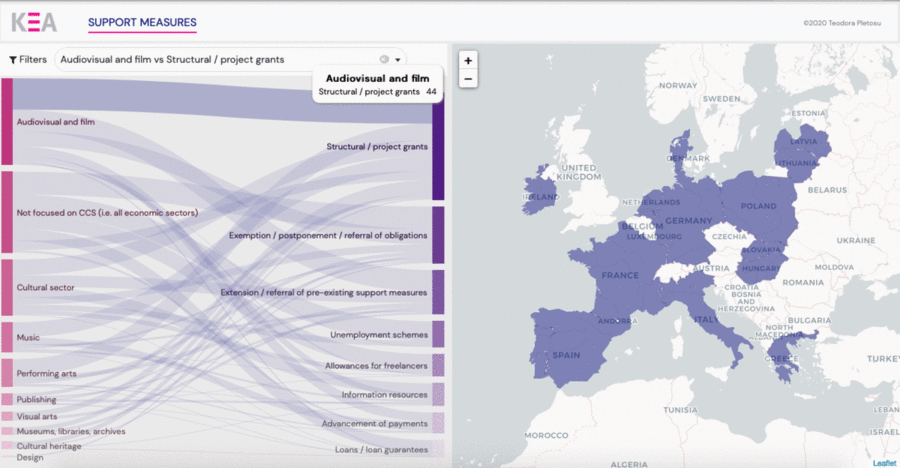
The COVID-19 outbreak has brought an entire economic sector to a standstill because of measures taken to implement lockdown and social distancing. The whole cultural value chain has been affected preventing staging of cultural events, touring, production of movies, TV programmes, recording sessions, releases of new films, books, closure of distribution outlets such as bookshops, cinemas, concert halls, museum, theatres, heritage sites or art galleries. Events and festivals, trade fairs are cancelled or postponed.
The Cultural and Creative Sector (CCS) is a very significant industry in Europe. Its Value-Added contribution to the economy is as significant as the Information and Communication technology (ICT) sector. According to Eurostat across the EU-28, there were 8.7 million people in cultural employment in 2018 equivalent to 3.8 % of the total number of persons employed. In 2017, there were 1.1 million cultural enterprises in the EU-27. The sector has been growing steadily over the years due to the increased demand for entertainment and culture.
CCS organisations are not like any other businesses. Across the EU-28, one third (33 %) of the cultural workforce is self-employed, compared with an average of 14 % for the whole economy. As such, the relative weight of self-employment in the field of culture is more than twice as high as the average for total employment. Precarity of working conditions is a specific of this industry. The sanitary crisis has made things worse. The sector is also relying on public funding as part of culture, education and tourism policies, with general government expenditure across the EU on cultural services, broadcasting and publishing amounting to €90 billion or 1.4 % of all general government expenditure in 2018.
Just as importantly, CCS play a crucial role in the wellbeing of communities and social cohesion. They are engines of collective sense making. They are part of an essential ecosystem which values freedom of expression, innovation, the sharing of collective experiences and emotions. Artists express our collective consciousness.
All these elements justify the adoption of specific policy measures to help mitigate the impact of COVID-19 on CCS.
We have attempted to provide an overview of policy measures in the EU-27. The exercise is difficult considering the non-harmonious way of reporting measures, different terminologies, the diverse administrative competences (centralised vs decentralised) and the way measures are being implemented.

We identified, from various sources, close to 500 single support actions taken at national level from governments and other public and private institutions (e.g. Arts councils or National Arts institutions, Media regulators, CCS dedicated support structures, foundations and associations). Some measures have a global economic scope but a large number are tailored to the CCS. We propose a typology of support measures with the following 8 categories:
- Structural / Project grants
- Extension / Referral of already-existing support measures
- Unemployment schemes
- Loans / Loan guarantees
- Exemption / Postponement / referral of legal obligations (tax, rent..)
- Advancement of payments.
- Information resources
- Allowances for freelancers
The following table indicates that the most popular measures in the EU are linked to the availability of grants, the deferral of legal obligations and social protection schemes.
On the other hand, loans and loan guarantee mechanisms to sustain financial viability were adopted in 17 countries only.
Considering the reliance of CCS on self-employed and freelancers, further studies would be required to better understand the impact of policy measures aimed at protecting artists and cultural workers. Some EU countries provide a specific status for artists. In other countries protection from social distress and harm will depend on the scope of general unemployment schemes. The initial analysis does not include specific support measures taken at regional level notably in federal States such as Belgium and Germany or by regional authorities with a strong competence in culture (Spain). Cities throughout the European Union have also adopted specific emergency measures for cultural workers and entrepreneurs in need (usually in the form of personal allowances).
Now Europe is entering deconfinement mode. Some countries are progressively adapting support measures to enable the recovery of the CCS. It will be important to sustain investment in culture to avoid the collapse of the creative ecosystem. Countries with strong public funding for the arts are better placed to envisage the future of their local CCS ecosystem. Germany decided to put EUR 1 billion aside dedicated to CCS. At the same time, tax credits and loans are being made available to support opening and/or implementation of risk prevention plans (Italy, Spain, France).
Not all CCS businesses are victims of the pandemic. Online content services benefited from increased demand in subscription or on-demand services. Whilst impacted by the production pause the streaming giant Netflix announced in April that it gained 15.77 million new paid subscribers globally, well above the 7 million it had expected. The music-streaming platform Spotify said it gained 6 million subscribers in the first quarter of 2020. Similarly, news media affected by less advertising saw increased online subscriptions. There is greater demand for video games and in-game concerts are a new phenomenon. Sales of physical books online also exploded.
Future support measures will have to take into account new consumption patterns and trends with the objective of improving digital offering. Social distancing and new behaviours will mean encouraging outdoor activities. As for other economic sectors, financial support will probably be made conditional to increase cultural participation and the reaching of social cohesion objectives (gender and racial equality for instance) or environmental objectives (less polluting and sustainable events). Clearly the crisis will spur the digitization of culture and accelerate the digital shift. The economic crisis will also encourage collaborative ventures with a view to pool resources across creative sub-sectors and across countries. Large and well-funded cultural institutions will have to show solidarity with smaller operators (sharing venues that are more compliant with social distancing rules). Cultural workers will play a key part in building solidarity, resilience and in confronting global challenges.